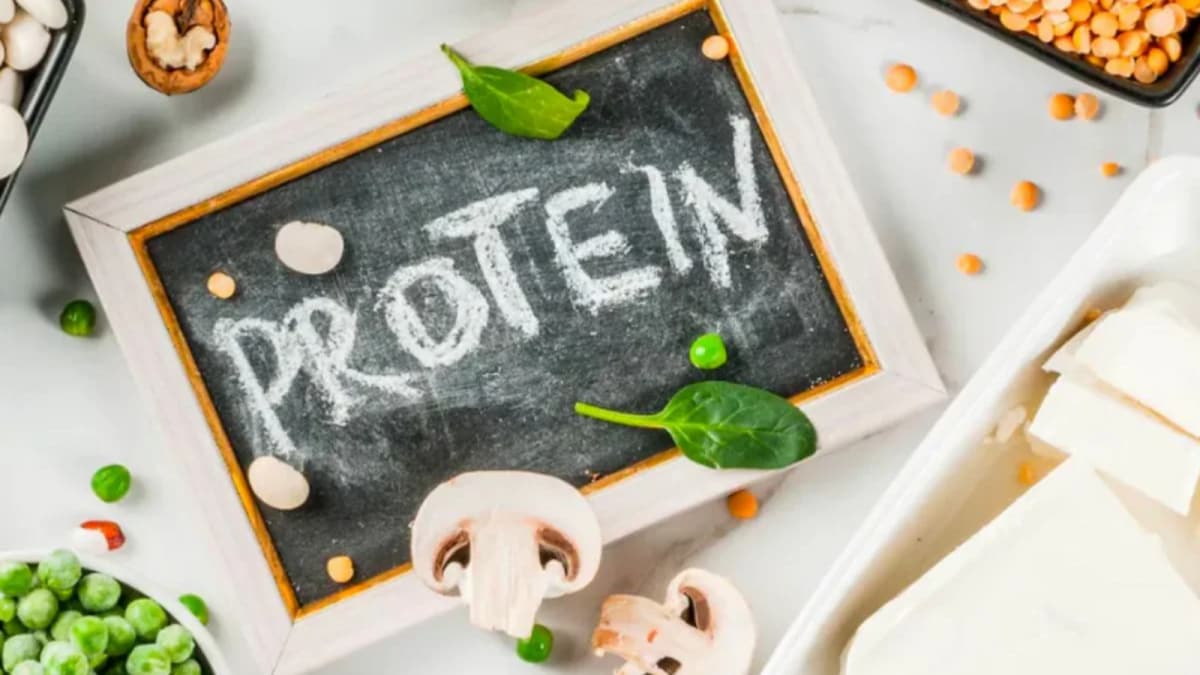Last Updated:
Pairing protein with fiber and complex carbohydrates ensures better absorption, satiety, and balanced nutrition

How Much Protein Do You Need Daily? Experts explain Indian protein requirements and smart food combinations
Protein is often called the building block of life, and for good reason. It fuels muscle growth, supports hormones and enzymes, strengthens immunity, and even nourishes skin and hair. Yet, despite its importance, many Indians still don’t meet their daily protein requirements.
So, how much protein do you really need in a day, and what are the best Indian food combinations for complete protein intake? We asked Rutu Dhodapkar, Clinical Dietician & HOD, P.D. Hinduja Hospital and MRC, Khar, Mumbai, and Dr. Yashawant Kumar, Founder and CEO, Benefic Nutrition, for their insights.
Why Protein is Essential
According to Rutu Dhodapkar, protein is vital for:
Building muscles, hormones, and enzymes
Supporting skin, hair, and nail health through keratin and collagen
Strengthening immunity and regulating metabolism
Helping the body heal during illness, post-surgery, or after workouts
Acting as a steady source of energy throughout the day
Daily Protein Requirement
Protein needs vary by age, activity, and health condition.
Rutu Dhodapkar shares a weight-based approach:
Adults: 0.8 – 1 g/kg body weight
Active adults & fitness enthusiasts: 1.2 – 1.6 g/kg body weight
Athletes & heavy trainers: 1.6 – 2 g/kg body weight
Older adults, recovery or illness: 1 – 1.2 g/kg body weight
Renal patients: 0.6 – 0.8 g/kg body weight
Renal patients on dialysis: 1 – 1.2 g/kg (up to 1.4 g/kg if needed)
Dr. Yashawant Kumar cites ICMR guidelines, which simplify intake for the average Indian adult:
Men: 60 g/day
Women: 55 g/day
He notes that men generally require more protein due to higher muscle mass, but lifestyle and health conditions can shift these values.
Protein Requirements for Children
Children need protein for muscle growth, brain development, and overall wellbeing. According to Dr. Kumar:
1–3 years: 16 g/day
4–6 years: 20 g/day
7–9 years: 29 g/day
10–17 years: 39–54 g/day
Protein for Weight Loss and Weight Gain
Protein isn’t just about health—it’s a key tool for body composition goals.
For weight loss, says Dr. Kumar, protein helps control hunger, reduces snacking, and preserves muscle mass. Recommended intake: 1.2–1.5 g/kg body weight.
For weight gain, protein supports muscle building, especially when combined with strength training.
Protein Sources
Rutu Dhodapkar divides protein-rich foods into two categories:
Animal-based proteins: eggs, chicken, fish, dairy, lean meats
Plant-based proteins: lentils, beans, chickpeas, soy (tofu, soy milk), nuts, seeds, quinoa, millets
Best Protein Combinations in Indian Meals
Indian diets naturally offer excellent protein pairings. Both experts recommend combining foods to create complete proteins that supply all essential amino acids.
1. Cereal + Pulse
Rice with dal, khichdi, or dal-roti
Cereals are low in lysine but high in methionine, while pulses balance it out.
2. Dairy + Grain
Paratha with curd, roti with paneer, poha with curd
Wheat protein pairs well with dairy to fill lysine gaps.
3. Millet + Pulse
Bajra roti with moong dal and vegetables
A powerful combination rich in protein and fiber.
4. Nuts, Seeds + Legumes
Sprouts with peanuts, hummus with sesame, peanut butter on whole wheat bread
Adds healthy fats along with protein.
5. Fermented Foods
Idli, dosa, dhokla
Fermentation enhances protein absorption and aids digestion.
6. Dairy + Vegetables
Paneer-tofu curry, vegetable kofta in milk-based curry, or vegetable raita
Combines protein with vitamins, minerals, and fiber.
Key Takeaway
Both experts agree: it’s not just about how much protein you eat, but how you combine it. Pairing protein with fiber and complex carbs ensures balanced nutrition, better absorption, and long-term health benefits.
FAQs on Daily Protein Requirement
How much protein do I need daily in India?
As per ICMR, Indian adult men need about 60 g of protein per day, while women need 55 g. This varies with age, lifestyle, and health conditions.
How much protein should I eat per kg of body weight?
Sedentary adults need 0.8–1 g/kg, active adults need 1.2–1.6 g/kg, and athletes may require 1.6–2 g/kg of body weight.
Which Indian foods are high in protein?
Lentils, beans, chickpeas, soy products, paneer, eggs, chicken, fish, nuts, seeds, quinoa, and millets are excellent Indian protein sources.
What are the best vegetarian protein combinations?
Rice with dal, bajra roti with moong dal, idli or dosa, sprouts with peanuts, and roti with paneer are some of the best vegetarian protein pairings.
Does protein help with weight loss and weight gain?
Yes. Protein aids weight loss by keeping you fuller for longer and maintaining muscle mass. For weight gain, it helps build muscle when paired with resistance training.

Swati Chaturvedi, a seasoned media and journalism aficionado with over 10 years of expertise, is not just a storyteller; she’s a weaver of wit and wisdom in the digital landscape. As a key figure in News18 Engl…Read More
Swati Chaturvedi, a seasoned media and journalism aficionado with over 10 years of expertise, is not just a storyteller; she’s a weaver of wit and wisdom in the digital landscape. As a key figure in News18 Engl… Read More







